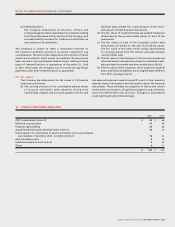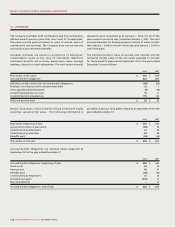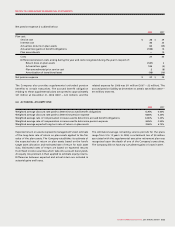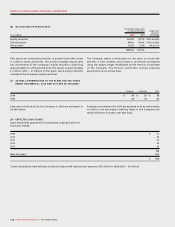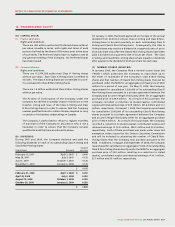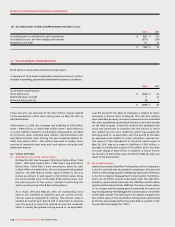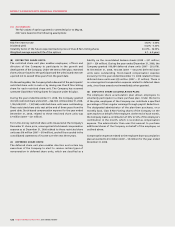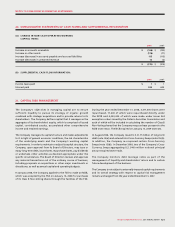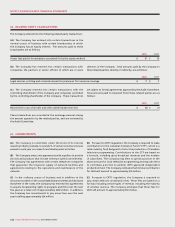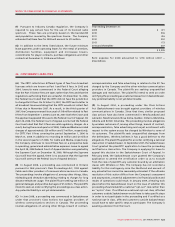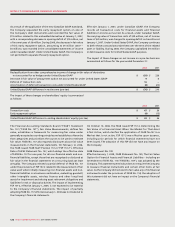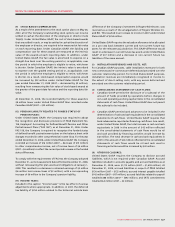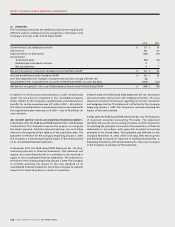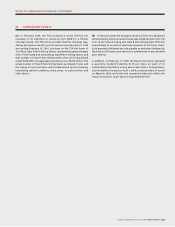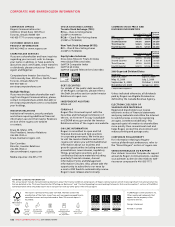Rogers 2008 Annual Report Download - page 127
Download and view the complete annual report
Please find page 127 of the 2008 Rogers annual report below. You can navigate through the pages in the report by either clicking on the pages listed below, or by using the keyword search tool below to find specific information within the annual report.
ROGERS COMMUNICATIONS INC. 2008 ANNUAL REPORT 123
NOTES TO CONSOLIDATED FINANCIAL STATEMENTS
misrepresentation and false advertising in relation to the 911 fee
charged by the Company and the other wireless communication
providers in Canada. The plaintiffs are seeking unquantified
damages and restitution. The plaintiffs intend to seek an order
certifying the proceeding as a national class action in Saskatchewan.
Any potential liability is not yet determinable.
(D) In August 2004, a proceeding under the Class Actions
Act (Saskatchewan) was brought against providers of wireless
communications in Canada. Since that time, similar proposed
class actions have also been commenced in Newfoundland and
Labrador, New Brunswick, Nova Scotia, Québec, Ontario, Manitoba,
Alberta and British Columbia. The proceeding involves allegations
by wireless customers of, among other things, breach of contract,
misrepresentation, false advertising and unjust enrichment with
respect to the system access fee charged by Wireless to some of
its customers. The plaintiffs seek unquantified damages from
the defendants. Wireless believes it has a good defence to the
allegations. The plaintiffs applied for an order certifying a national
class action in Saskatchewan. In September 2007, the Saskatchewan
Court granted the plaintiffs’ application to have the proceeding
certified as a class action. The Company is applying for leave to
appeal this decision to the Saskatchewan Court of Appeal. In
February 2008, the Saskatchewan court granted the Company’s
application to amend the certification order so as to exclude
from the class of plaintiffs any customer bound by an arbitration
clause with Wireless or Fido. The Company has not recorded a
liability for this contingency since the likelihood and amount of
any potential loss cannot be reasonably estimated. If the ultimate
resolution of this action differs from the Company’s assessment
and assumptions, a material adjustment to its financial position and
results of operations could result. In January 2009, a hearing took
place before the Saskatchewan Court on the issue of whether this
proceeding should establish a national “opt-out” class rather than
an “opt-in” class. If certified as a national opt-out class, affected
customers outside Saskatchewan would have to take specific steps
in order to not participate in the proceeding and if certified as a
national opt-in class, affected customers outside Saskatchewan
would have to take specific steps to participate. The Company is
awaiting a decision from the Court.
(F) Pursuant to Industry Canada regulation, the Company is
required to pay certain fees for the use of its licenced radio
spectrum. These fees are primarily based on the bandwidth
and population covered by the spectrum licence. The Company
estimates that these fees for 2009 will amount to $75 million.
(G) In addition to the items listed above, the future minimum
lease payments under operating leases for the rental of premises,
distribution facilities, equipment and microwave towers,
commitments for player contracts, purchase obligations and other
contracts at December 31, 2008 are as follows:
Year ending December 31:
2009 $ 721
2010 536
2011 416
2012 252
2013 173
2014 and thereafter 207
$ 2,305
Rent expense for 2008 amounted to $178 million (2007 –
$166 million).
24. CONTINGENT LIABILITIES
(A) The CRTC collects two different types of fees from broadcast
licencees which are known as Part I and Part II fees. In 2003 and
2004, lawsuits were commenced in the Federal Court alleging
that the Part II licence fees are taxes rather than fees and that the
regulations authorizing them are unlawful. On December 14, 2006,
the Federal Court ruled that the CRTC did not have the jurisdiction
to charge Part II fees. On October 15, 2007, the CRTC sent a letter to
all broadcast licencees stating that the CRTC would not collect Part
II fees due in November 2007. As a result, in the third quarter of
2007, the Company reversed its accrual of $18 million related to Part
II fees from September 1, 2006 to June 30, 2007. Both the Crown and
the applicants appealed this case to the Federal Court of Appeal. On
April 28, 2008, the Federal Court of Appeal overturned the Federal
Court and ruled that Part II fees are valid regulatory charges. As a
result, during the second quarter of 2008, Cable and Media recorded
charges of approximately $30 million and $7 million, respectively,
for CRTC Part II fees covering the period September 1, 2006 to
March 31, 2008. In addition to recording $5 million and $2 million
in the second quarter of 2008, for Cable and Media, respectively,
the Company continues to record these fees on a prospective basis
in operating, general and administrative expenses. Leave to appeal
the April 28, 2008 Federal Court of Appeal decision was granted by
the Supreme Court on December 18, 2008. Although the Supreme
Court will hear the appeal, there is no assurance that the Supreme
Court will overturn the Federal Court of Appeal decision.
(B) In August 2008, a proceeding was commenced in Ontario
pursuant to that province’s Class Proceedings Act, 1992 against
Cable and other providers of communications services in Canada.
The proceedings involve allegations of, among other things, false,
misleading and deceptive advertising relating to charges for long
distance telephone usage. The plaintiffs are seeking $20 million in
general damages and punitive damages of $5 million. The plaintiffs
intend to seek an order certifying the proceedings as a class action.
Any potential liability is not yet determinable.
(C) In June 2008, a proceeding was commenced in Saskatchewan
under that province’s Class Actions Act against providers of
wireless communications services in Canada. The proceeding
involves allegations of, among other things, breach of contract,


